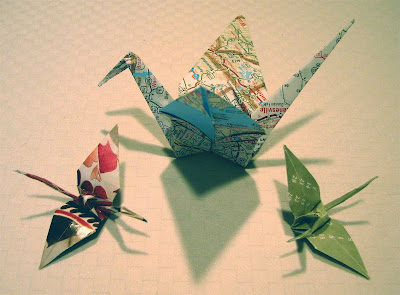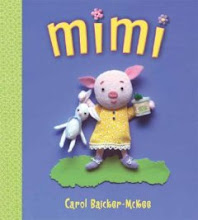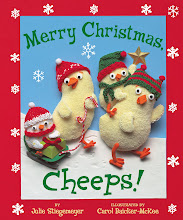I'm making a wish for peace in 2010 - for the world, for my family and friends including all of you, and for myself.
The paper crane is a symbol of peace. In 2001, I gave out paper crane ornaments (like the one in my current header) as my holiday cards, and this year I'm planning to make one daily - at the end of the year I'll turn them into something cool and auction the resulting piece for a donation to a peace-related charity (not sure which one yet).
The cranes are easy to make once you get the hang of them. A google search will reveal many, many tutorials for making them, including this animated diagram one here (I think it's pretty easy to follow.) Adding some beads makes the cranes hang a little better and look good as a stand-alone mobile. I use jewelry wire threaded through a long needle (large enough to fit through the body of the crane, from the center to the point on the top). The first bead can be a charm or dangling bead, and you can add others or just pass the wire through the body. You can also put more beads above if you like, or just make a loop in the wire to thread a ribbon through for hanging. For the last few years, I've made these often, and I keep them on a branch in my living room; if I need a quick gift for a visitor or to enclose in a note, I just grab one.
For several years, I've been making the cranes mostly from recycled papers (like the ones in the photos above). Here are a few close-ups of some from last year (though I apologize for all these crappy pix). These ones are from security envelopes:
And these are made from (left to right): a page in a magazine, a map, and a calendar page.
 There are several excellent children's books about paper cranes, including this one by Rosemary Wells, one of my favorite author-illustrators. Yoko makes cranes to stay connected to her grandparents who live far away, which is a nice use for your cranes too.
There are several excellent children's books about paper cranes, including this one by Rosemary Wells, one of my favorite author-illustrators. Yoko makes cranes to stay connected to her grandparents who live far away, which is a nice use for your cranes too.
This gorgeous award-winning book by the versatile Molly Bang is one of my all-time favorites with cut-paper illustrations. Her paper sculptures (and the book design) are so clever and detailed and just beautiful - they really make the story come to life. The book was first published in 1985, which means it squeaks by the CPSIA disaster (phew) and is in print still in any event. You can read the Molly Bang's excellent discussion about the Chinese folk tale, her book, and how teachers can use it with their students here.

And finally, the book that is synonymous with paper cranes for generations of students: the true story of Sadako, a 12-year-old girl who contracted leukemia in the wake of the atomic bombing of Japan and tried to fold 1000 paper cranes to make her wish of recovery come true (there are conflicting stories about whether she succeeded in finishing the cranes).
The book is an excellent starting point for many difficult discussions with older kids and young teens. It's a vintage book, first published in 1977, so the older copies do fall under the CPSIA axe; fortunately, it has been reprinted many times and is still readily available. You can read the wikipedia article about Sadako here. Recently, Sadako's brother, who still has some of the original cranes, donated one to the 9/11 memorial. You can read the CNN story about it and see a photo of one of Sadako's cranes here.
I'll close with the words on the base of the Children's Peace Memorial in Japan that was inspired by Sadako's story (and to which you can send your cranes):
"This is our cry.
This is our prayer.
For building peace in this world."






















